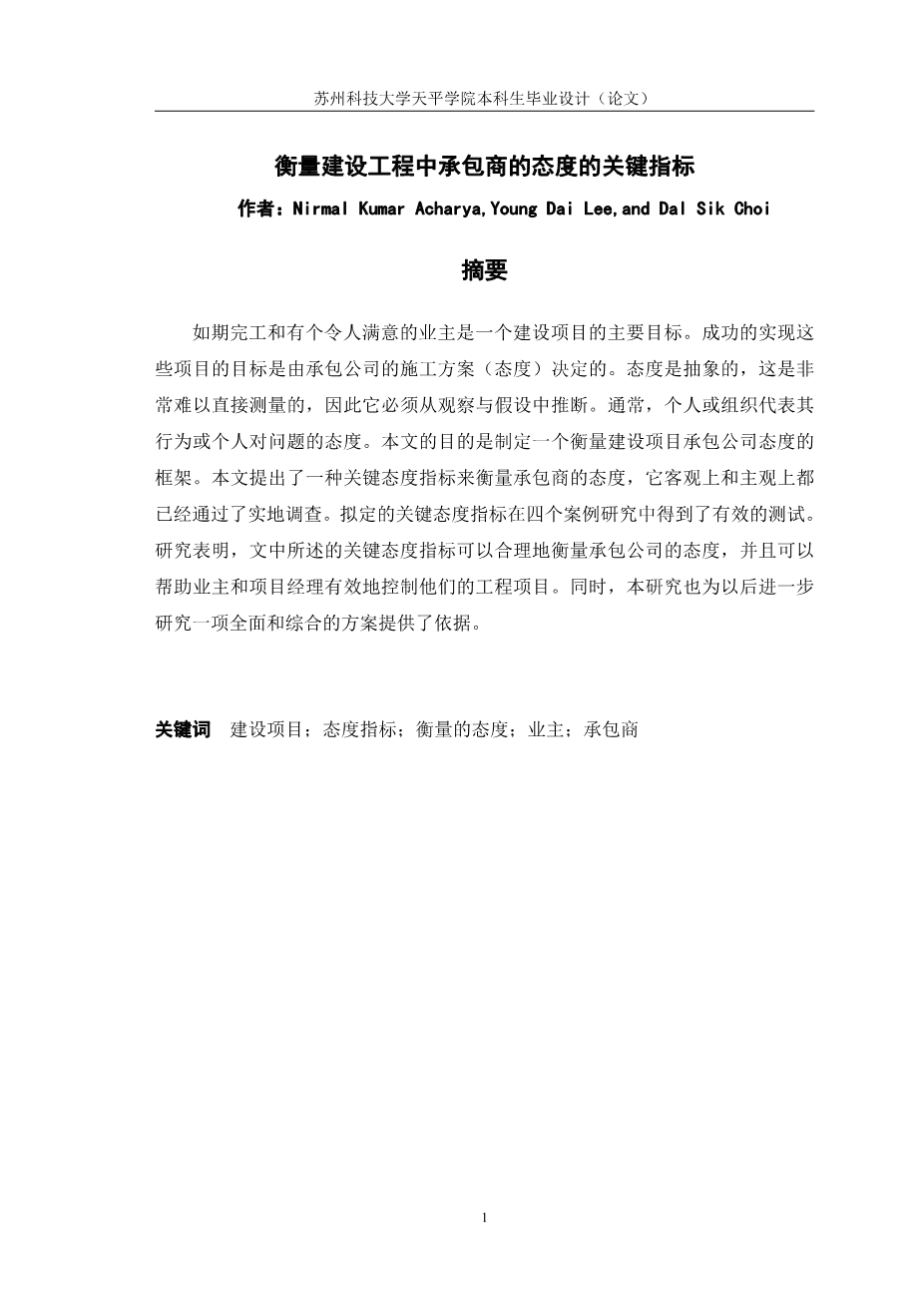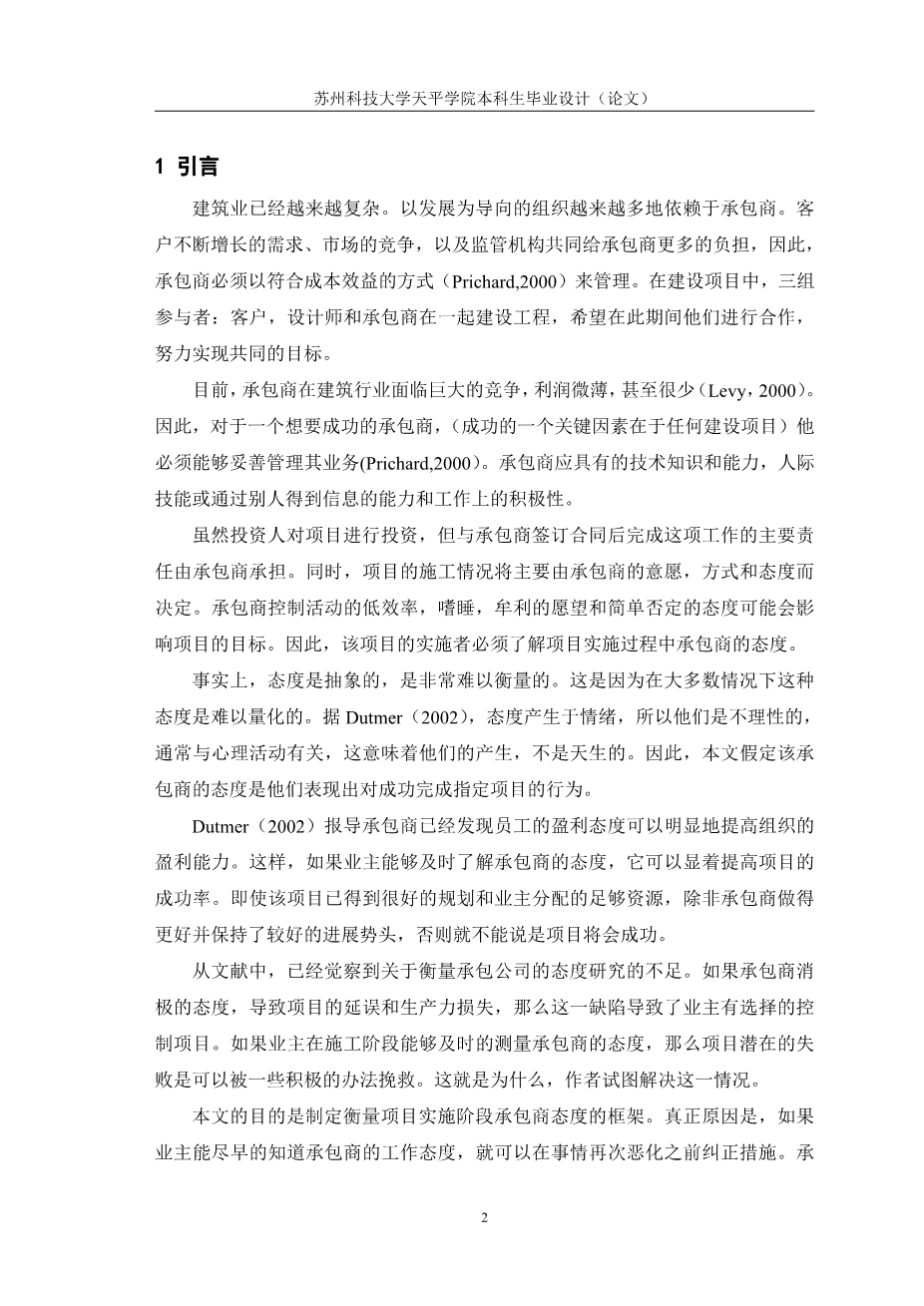Key Attitude Indicators for Measuring Attitude of
Contractors in Construction Projects
By Nirmal Kumar Acharya, Young Dai Lee, and Dal Sik Choi
Abstract:
Timely completiaon and a satisfied owner are the prime objectives of a construction project. The success to achieve these project objectives is fully depends on the working approaches (attitude) of a contractor company. Attitude is abstract, which is very difficult to measure directly; therefore it must be inferred from the assumed relationship with observable indicators. Commonly, behavior shown by a person or organization represents its attitude about things or persons or issues. The aim of this paper is to develop a framework for measuring attitude of a Contractor Company in an ongoing construction project. In this paper a set of key attitude indicators (KAIs) measured both objectively and subjectively have been developed through a field survey. The validity of the proposed KAIs is also tested by four case studies. The results of the study show that the KAIs stated in the paper can reasonably measure the attitude of Contractor Company and can be helpful for the owners and project managers to control their projects effectively. This study also provides few significant insights into developing a general and comprehensive base for further study.
Keywords: construction project, attitude indicators, measuring attitude, owner, contractor
1. Introduction
Construction is becoming increasingly complex. Development oriented organizations are increasingly come to depend on contractors. Ever-growing demands from clients, competition, and regulatory agencies create added burdens to contractors that must be managed in a cost-effective manner (Prichard, 2000). In a construction project, three groups of participants: the client, the designer and the contractor are brought together for a temporary period to build projects during which they are expected to cooperate and work towards a mutual goal.
Contractors are now facing immense competition in construction industry, profits have been modest or even least (Levy, 2000).Thus, for a contractor to be successful-a critical element for success on any construction project-the contractor must be able to properly manage its business as a business (Prichard, 2000). A contractor should have technical knowledge and ability, interpersonal skills/ability to get things done through others, and motivation to produce not only a lot of work, but a lot of good work too.
Though the clients invest money on the project; but, after having contract with the contractor the major responsibility to finish the work goes to the contractor and the performance of the project will be dependent on mainly will, manner and attitude of the contractor. Contractorrsquo;s inefficiency to control activities, lethargy, profit-making desire and simple negative attitude might jeopardize the project goals. So, the project implementers need to be acquainted with the attitude of contractor during project implementation period.
In fact, attitude is abstract and is very difficult as well as complicated to measure. This is because in most instances the quantification of attitude is difficult. According to Dutmer(2002) attitudes arise from emotions, so they are not rational and typically associated with psychological events, which means they are acquired, not inherited. So, it is assumed in this paper that the attitude of the contractors is the behavior demonstrated by them towards successful completion of the assigned project.
Dutmer (2002) has reported that some contractors have discovered that developing a profit attitude among employees can significantly improve an organizationrsquo;s profitability. In this way, if the owner be able to perceive the attitude of the contractor timely, it can significantly improve the project success. Even though the project has been well planned and enough resources allotted from the owner, unless the contractor works better and keeps up the progress momentum, it cannot be said that the project will be success.
From literature, it has been perceived that there is lack of studies about measuring attitude of the Contractor Company. This lacuna has caused the owners having limited options to control the project, if contractorrsquo;s negative approach resulted in project as delay and loss of productivity. If the owner could be able to measure the attitude of contractor in time during the construction phase, then a potential failure of project could be saved by some proactive approaches. That is why; the authors have attempted to address this situation.
The purpose of this paper is to develop a framework for measuring attitude of a contractor company during the project implementation phase. The rationale behind this purpose is that if the owner able to know the
Fig. 1. Research Framework
contractorrsquo;s working attitude (not complying project objectives) as early as possible, then correcting measures could be applied before the situation worsens. Contractor attitude identification process framework is shown in Fig. 1. Since the forms of construction project management are almost identical around the world, the results of this work are expected to be useful for all kinds of project implementers.
The paper is composed of thirteen sections. The paper first discussed about factors responsible for change of attitude of contractors followed next by a review of attitude factors. Basedon a field instrument, a set of KAIs (Key attitude indicators) developed to measure attitude of contractors. The contractors are classified according to attitude score in section eight. To demonstrate the appli
剩余内容已隐藏,支付完成后下载完整资料


英语译文共 21 页,剩余内容已隐藏,支付完成后下载完整资料
资料编号:[613953],资料为PDF文档或Word文档,PDF文档可免费转换为Word


